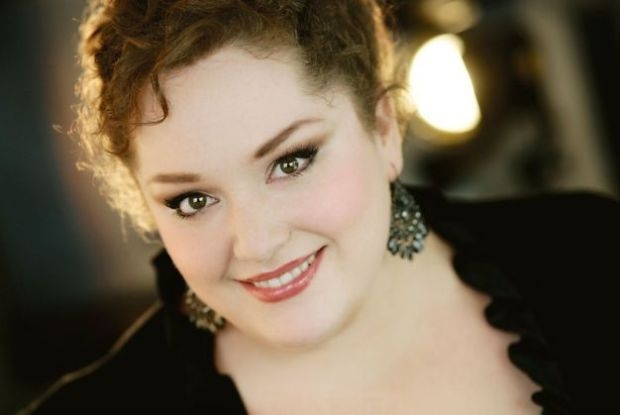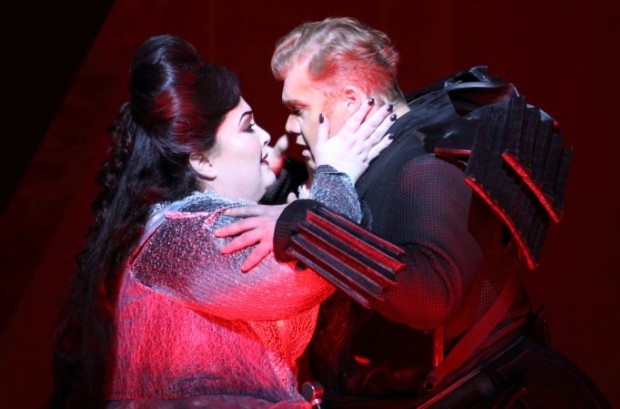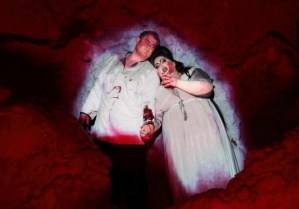Heidi Melton – 'I wouldn't trade the life I have'
The American soprano, English National Opera’s Isolde, on training, travel and ”Tristan”

Ask me who’s the most refreshingly irrepressible interviewee I’ve met in the past few years and it has to be the young American soprano who’s currently singing Isolde for ENO. This conversation with Heidi Melton, which took place midway through rehearsals for Tristan and Isolde, and before much was known about Daniel Kramer‘s production, ranged hither and yon. But it started (of course) with Wagner.
Who’s the tougher role, Brünnhilde (in the Ring cycle) or Isolde?
Oh, that’s difficult. I haven’t done the Götterdämmerung Brünnhilde yet so I can’t say. But right now my life is Isolde. She’s everything I eat and breathe, going over the text in the night and thinking ‘what does this mean?’. The whole thing about Brünnhilde is that she goes from god to human, but Isolde is so human throughout.
Isolde is much more of an interior character, isn’t she?
She is. In act one everybody says 'she’s so angry', and yes, she is, but the important thing is to try and figure out why. If I can distil it, it’s that she feels stupid. In my opinion Tristan’s betrayal has cut her to the core and she feels stupid for having loved him. Stupid for not having killed him. Stupid for being a pawn in a big game of chess. She’s angry with him, but she is furious with herself. And I think that’s the most real kind of anger. It’s easy to be angry at somebody, or at an inanimate object, but being angry with herself is something she has to live with day in and day out. Which is where we find her at the start of the opera.
What is it like to do a new production straight off the back of one you’ve just finished in Germany, but in a different language?
It’s crazy! I’ve never done anything like it and I don’t know that I ever will again. We’ll see. It’s been beautiful and rewarding and terrifying. To do it the first time in German was great—to get into the text and to feel the language it was written in—but English is my native language, so there’s now another layer to it.
About a week ago I went back to Germany to do my last performance there, in German of course. I flew out from London after a full day of rehearsal, did Tristan, then flew back the next day and did six hours of rehearsal here. And I found that when I was doing it again in German the English actually aided my performance.
But muscle memory kept you safe from infecting the production with what you’ve been doing in London?
I was terrified! I kept waking up in the night for three days beforehand, running through the German and saying ‘do I remember this?’. In the end I slipped into one 'Denglish’ phrase and thought 'oh gosh', but the rest of it was fine. Nobody noticed except for me and my Brangäne.
The two productions are completely different, so when I got onto that set and into that costume it was automatic to sing in German. That was fascinating to me. Brains are incredible things.
With Stuart Skelton as Tristan and Edward Gardner conducting, you’re working with the core of ENO’s recent history. How do you find the family dynamic?
Stuart Skelton holds a very special place in my heart because he was my first Siegmund when I sang Sieglinde [in Die Walküre]. That was October 2009 with the BBC SSO and Donald Runnicles. And that night was the first time when I thought I fitted in. It felt right, and it was a gorgeous thing.
To sing Isolde to Stuart’s Tristan is not nothing. He’s incredible—his artistry, his musicianship… We’re both nerds and we geek out with the score. And Karen Cargill [Brangäne] is one of my dearest friends. She is splendid as a person, as a singer and as a musician.

© Catherine Ashmore
It’s my first time working with Ed Gardner and I love that he’s so passionate about this art form. There are many people who take what we do for granted, but we are at the service of music. He has such attention to detail and he’s still curious about learning about the instrument – 'How does your voice work?'. To have somebody who can put their ego aside and focus on serving the music is incredible. When we all have the intention of serving the music, that’s when the best things come out.
Did you always plan to become a dramatic soprano?
Oh Lord no! Not in the least. When I was young I was always musical, but I wanted to be a professional soccer player. But when I auditioned for a select soccer team I was just put on a waiting list. I was crushed, destroyed. I locked myself in the bathroom and my older sister picked the lock, came in and said "Quit crying and do something else. You’re always singing—try that".
When I began studying my voice wasn’t huge. They said I wasn’t good enough to be a singer, so "Go into the music education program". Then my teacher asked me to do a couple of chest voice exercises for a week. I didn’t know what chest voice was, but I tried them, came back and my voice had grown about 20 sizes. I didn’t expect that.
Nobody knew what to do with it. I was kind of a contralto, and then I auditioned for the Curtis Institute in Philadelphia where the head of the undergrad department said "I want to accept you, but I have to tell you you’re not a contralto, you’re a baby dramatic soprano". I didn’t know what that meant. He said "Someday you’re going to sing Isolde". So that day I went to the library, got a copy and started listening to it.
Are there any roles you wouldn’t touch?
At this point in my career I wouldn’t touch Turandot, La fanciulla del West or Nabucco. I don’t want to get caught in that mould, at least not yet. I have a friend who’s a gorgeous Zerbinetta in Ariadne auf Naxos, but she waited until she was 35 to sing Mozart’s Queen of the Night. When I asked her why, she said "because I don’t want to do just that all the time".
Any roles you feel your voice will grow into?
I’d love to sing Elektra at some point.
How are you with travel? With your career it can be a voice killer.
Yes, last winter I finished my last performance with the New York Philharmonic, drove straight to the airport and flew to Hong Kong where I had my first rehearsal for Die Walküre.
Jet lag is awful, and so are little things like buying light bulbs. The first time I went to France and the light went out there were so many different bulbs in the store, all different from home, so I bought them all and still didn’t get the right one. It was the start of a long weekend and I lived in the dark for three days.
But I wouldn’t trade the life I have.
Tristan and Isolde continues in the repertoire of English National Opera at the London Coliseum until 9 July.













